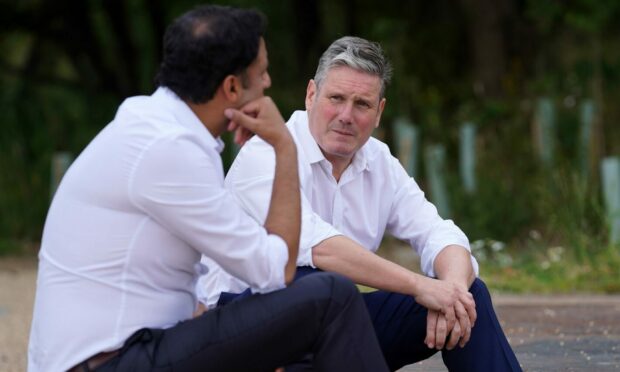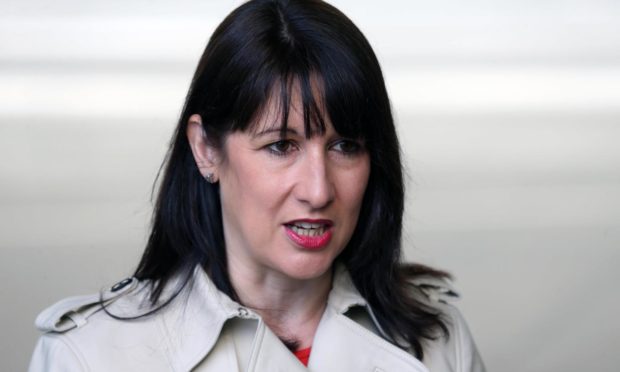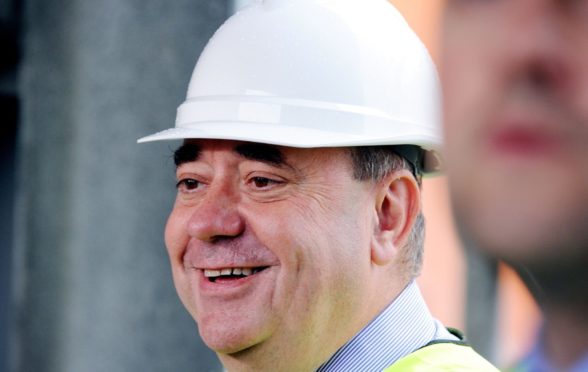Scottish Labour leader Anas Sarwar said his party is being “grown up” by pausing a massive green prosperity plan while also raising concerns over the future of oil and gas.
Mr Sarwar stood by the decision taken by shadow chancellor Rachel Reeves on Friday to halt plans to spend £28 billion a year until 2030.
The commitment had been made in 2021.
Ms Reeves now says the Tories have “crashed” the economy and forced her to assess economic stability first.
The move is seen as another problem for Scottish Labour’s attempt to see off Tory attacks over unclear policies on the future of North Sea oil and gas, as well as renewable energy.
‘Absolutely going to deliver’
In Fife on Friday, Mr Sarwar told us: “Labour is absolutely going to deliver the green prosperity plan. We are 100% committed to it.
“But we have to live in the real world and be grown ups.
“When the plan was announced two years ago, the interest rates on borrowing for government were really low and because of the Tories crashing the economy and the global circumstances, interest rates on borrowing are now through the roof.”
Mr Sarwar, a Glasgow MSP, said it would be irresponsible to make the same mistakes as Liz Truss, whose brief term as prime minister is widely blamed for hurting the economy.
He accepts there are questions to be answered over energy and North Sea exploration.
Responding to those who attack Labour for wanting halt oil and gas too soon, Mr Sarwar said: “We are very clear. There will be no cliff edge.
“There will be no turning off of the taps.”
‘Grown up’
Polls suggest Labour is enjoying a bounce in Scotland and could form a majority UK Government at the next general election.
Is he worried about voter reaction in communities where energy is a major employer?
“I think it demonstrates that we are taking a grown up, serious approach,” he said.
“Not just to winning the next election but what we would do if we win.
“People have had empty promises for far too long and the green transition is the perfect example of that.
“We were promised the Saudi Arabia of renewables from the SNP government when Alex Salmond was first minister.”
Announcing the backtrack on Friday, Ms Reeves said she is showing responsibility.
“I will never be reckless with the public finances,” the shadow chancellor said.
“Economic stability, financial stability, always has to come first and it will do with Labour.
Labour’s flagship green prosperity plan, billed as the party’s answer to Joe Biden’s clean energy-promoting Inflation Reduction Act, included pledges to invest more in projects such as wind and carbon capture.
But its fiscal rule – that debt must be falling as a share of national income after five years – has always been the party’s priority, Ms Reeves argued.
Greenpeace criticises Labour
Greenpeace UK said any U-turn would be a “huge mistake” and accused Labour of “prevarication”.
The green prosperity announcement came as the UK Government announced the windfall tax on North Sea producers will be removed if oil and gas prices fall to “historically normal levels”.
The North Sea industry is currently taxed at 75% of profits, including the 35% energy profits levy, or windfall tax, which was introduced last year amid surging commodity prices.
But the government now says that if oil and gas prices fall “for a sustained period the tax rate for oil and gas companies will return to 40%”.



Conversation